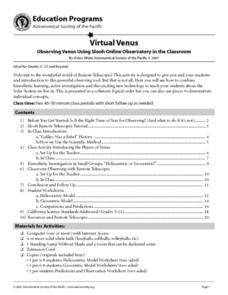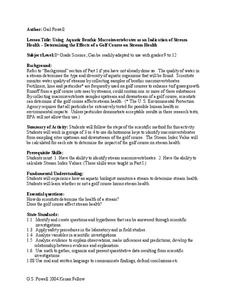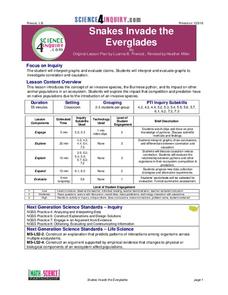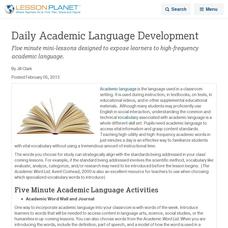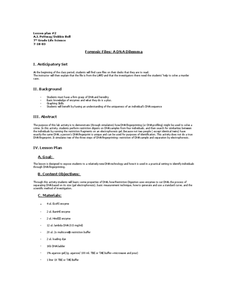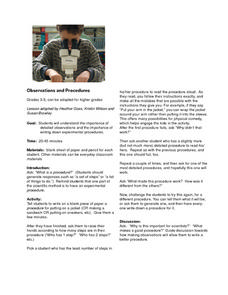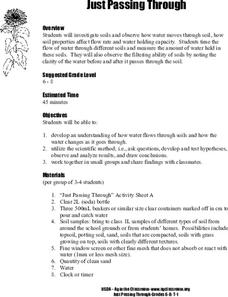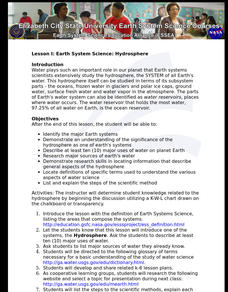Centers for Disease Control and Prevention
Understanding the Epidemiologic Triangle through Infectious Disease
Introduce infectious diseases and the epidemiologic triangle. A helpful resource describes the agent, host, and environment from the three vertices as well as the time factor, which is in the middle. Scholars complete a simple...
Curated OER
Virtual Venus
Students practice using the tool of remote telescopes in order to make observations in space. The lesson includes the best times of year to make observations. They use the internet to obtain information and to initiate the use of the...
Curated OER
Slime and Intermolecular Attractions
Students explore the strength of intermolecular attractions. They make slime and compare the difference in the physical properties of sheet and powdered polyvinyl alcohol with polyvinyl acetate.
Curated OER
Turning the Tide on Trash: Marine Debris Curriculum
Six different lessons comprise this unit on marine debris. Science, language arts, social studies, and art projects make this an ideal interdisciplinary unit. The result will be well-informed future citizens who can help make a...
Curated OER
Microbes That Are Your Buddies - Biology Teaching Thesis
High schoolers analyze experimental data and draw conclusions. They are able to comprehend that not all microbes are harmful--they can be helpful to humans. Students are able to comprehend specific examples of cases in which microbes are...
Kenan Fellows
Determining the Effects of a Golf Course on Stream Health
Do golf courses affect the water organisms in nearby streams and ponds? Small groups collect samples of water upstream and downstream from a golf course and analyze the macroinvertebrates found and the stream index values of the two...
Science 4 Inquiry
Snakes in the Everglades
The Burmese python is on the loose ... and he's hungry! Illustrate the differences between causative and correlative relationships through an inquiry instructional activity. Pupils examine several sources of information to determine if...
Curated OER
Adventures in Earth Day: Why Do We Care About Our Environment? - Biology Teaching Thesis
Students are introduced to Earth Day and the importance of this day. They make a collage, students can use articles, pictures, words, etc., in magazines or newspapers or online, that relate to Earth Day, the environment and environmental...
Curated OER
Autism And The Brain
Help your class understand Autism. They conduct research into how the brain is effected by the disorder of autism. Then they write a letter to the Center For Disease Control about their findings and forward some of the new research to them.
Curated OER
Daily Academic Language Development
Five minute mini-lessons designed to expose learners to high-frequency academic language.
Curated OER
Language Arts: Plot Summary
Eighth graders implement plot summary organizers to identify essential elements such as conflict and resolution in literature. In pairs, they retell fairy tales to each other and complete plot summaries about them. As students read new...
Curated OER
Walking Magic
Students conduct experiment with water striders by placing the insect in two different solutions and discuss their observations. They discover that weight and surface area are important factors in their experiment.
Curated OER
Ice Cream in a Bag
Students discuss the three states of matter and how they are affected by temperature. They make ice cream in a bag while observing how temperature change affects the mixture. They discuss why some specimens froze more quickly than others...
Curated OER
Human Fingerprints: No Two The Same
Learners will be offered numerous opportunities to further enhance their observational skills as well as the integration of math with their continual exposure to the metric system, measurement, and graphing to represent their data....
Curated OER
Archimedes' Principle of buoyancy
Students use the internet to research Archimedes' principle of buoyancy. In groups, they summarize the principle and share it with the class. They also participate in experiments in which they test the principle and share their results...
Curated OER
Color Mixing
Students experiment with primary colored water to mix new colors. They record new colors on a simple data sheet and share opinions on their work.
Curated OER
Oil Well That Ends Well
Focusing on the effect of oil spills on the environment, learners conduct experiments to explore this issue. First, they create an ocean environment using materials provided. Then, they make a simulated crude oil substance from vegetable...
Curated OER
Forensic Files: A DNA Dilemma
Seventh-graders come in to science class to find a file on their desks detailing a crime to be solved! As a demonstration, you simulate the restriction of DNA samples and separate them by electrophoresis. From the gel, learners can...
Curated OER
Observations and Procedures
Young scientists critique the breakdown of detailed observations. They discover the importance of writing down experimental procedures. There are some guided discussion questions at the end of the resource.
Curated OER
Just Passing Through
Students explore how water moves through soil. They experiment with different soil types and record their findings.
Curated OER
The Tell-Tale Heart
Bring Edgar Allan Poe's spooky story to life! After reading the short story "The Tell-Tale Heart," middle and high schoolers identify the theme, character traits, irony, and other story concepts. During pre-reading, they take notes,...
Curated OER
Conveyor Belt Production
Students design a system that will move their glass product across a room in the plant. They must move the product 12 feet and their items cannot fall off at any time.
Curated OER
Find It!
Students analyze the basic concept of Global Positioning Systems using triangulation and measurement on a small scale in the classroom. They describe a satellite and how it helps in locating a person on Earth. They explain how...
Curated OER
Earth System Science: Hydrosphere
Students identify the major Earth systems, and describe at least ten major uses of water on planet earth. They research major sources of earth's water, and describe general aspects of the hydrosphere.



